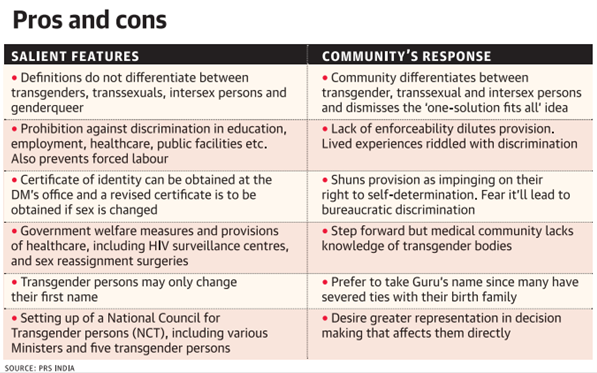The Transgender Persons (Protection of Rights) Bill, 2019 – PIB 22/12/2019 – Posted in: Press Information Bureau
The Transgender Persons (Protection of Rights) Bill, 2019
Ministry for Social Justice and Empowerment
WHAT
The Transgender Persons (Protection of Rights) Bill, 2019 was introduced in Lok Sabha on July 2019 and passed by Rajya Sabha in November 2019.
Definition of a transgender person
- The Bill defines a transgender person as one whose gender does not match the gender assigned at birth.
- It includes trans-men and trans-women, persons with intersex variations, gender-queers, and persons with socio-cultural identities, such as kinnar and hijra. Intersex variations is defined to mean a person who at birth shows variation in his or her primary sexual characteristics, external genitalia, chromosomes, or hormones from the normative standard of male or female body.
Prohibition against discrimination
The Bill prohibits discrimination against a transgender person, including denial of service or unfair treatment in relation to:
- education
- employment
- healthcare
- access to, or enjoyment of goods, facilities, opportunities available to the public
- right to movement
- right to reside, rent, or otherwise occupy a property
- opportunity to hold public or private office
- access to a government or private establishment in whose care or custody a transgender person is.
Right of Residence
Every transgender person shall have a right to reside and be included in his household. If the immediate family is unable to care for the transgender person, the person may be placed in a rehabilitation centre, on the orders of a competent court.
Employment
No government or private entity can discriminate against a transgender person in employment matters, including recruitment, and promotion. Every establishment is required to designate a person to be a complaint officer to deal with complaints in relation to the Act.
Education
Educational institutions funded or recognised by the relevant government shall provide inclusive education, sports and recreational facilities for transgender persons, without discrimination.
Health care
The government must take steps to provide health facilities to transgender persons including separate HIV surveillance centres, and sex reassignment surgeries. The government shall review medical curriculum to address health issues of transgender persons, and provide comprehensive medical insurance schemes for them.
Certificate of identity for a transgender person
A transgender person may make an application to the District Magistrate for a certificate of identity, indicating the gender as ‘transgender’. A revised certificate may be obtained only if the individual undergoes surgery to change their gender either as a male or a female.
Welfare measures by the government
The Bill states that the relevant government will take measures to ensure the full inclusion and participation of transgender persons in society. It must also take steps for their rescue and rehabilitation, vocational training and self-employment, create schemes that are transgender sensitive, and promote their participation in cultural activities.
Offences and penalties
The Bill recognizes the following offences against transgender persons:
- forced or bonded labour (excluding compulsory government service for public purposes)
- denial of use of public places
- removal from the household, and village,
- physical, sexual, verbal, emotional or economic abuse.
Penalties for these offences vary between six months and two years, and a fine.
National Council for Transgender persons (NCT)
The NCT will consist of:
- Union Minister for Social Justice (Chairperson);
- Minister of State for Social Justice (Vice- Chairperson);
- Secretary of the Ministry of Social Justice;
- one representative from ministries including Health, Home Affairs, and Human Resources Development.
Other members include representatives of the NITI Aayog, and the National Human Rights Commission. State governments will also be represented. The Council will also consist of five members from the transgender community and five experts from non-governmental organisations.
The Council will advise the central government as well as monitor the impact of policies, legislation and projects with respect to transgender persons. It will also redress the grievances of transgender persons.
Source: PRS India
READ MORE PIB UPDATES
- Tarapur Atomic Power Station (TAPS) Project
- Human Space Mission: Gaganyaan
- Bharat Bond Exchange Traded Fund
- Indian Navy Day
- INAS 314 – “RAPTORS”
- Mission 41K
- Development of Loktak Inland Waterways Project
- Global Bio-India Summit, 2019
You are on the Best Online IAS preparation platform. You are learning under experts.
We are present on Facebook- Diligent IAS, LinkedIn- Diligent IAS, YouTube- Diligent IAS, Instagram- Diligent IAS. Get in touch with us.

